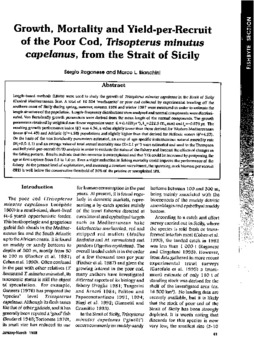Growth, mortality and yield-per-recruit of the poor cod, Trisopterus minutus capelanus, from the Strait of Sicily
Abstract
Length-based methods (LBMs) were used to study the growth of Trisopterus minutus capelanus in the Strait of Sicily (Messina Strait). A total of 16,304 'merluzzetto' or poor cod collected by experimental trawling off the southern coast of Sicily during spring, summer, autumn 1986 and winter 1987 were measured in order to estimate the length structure of the population. Length-frequency distribution were analyzed and normal components were discriminated. Von Bertalanffy growth parameters were derived from the mean length of the normal components. The growth parameters obtained by weighted non-linear regression were: K=0.462 (yr super(1)), L sub( infinity )=222.3 (TL,mm) and t sub(o)=-0.679 yr. The resulting growth performance index ( Phi ') was 4.36, a value slightly lower than those derived for Western Mediterranean (mean Phi '=4.45) and Adriatic ( Phi '=4.58) populations and slightly higher than that derived for Hellenic waters ( Phi '=4.27). On the basis of the von Bertalanffy parameters estimated, an array of age-specific instantaneous natural mortality rate (M sub(t)=0.5-1.1) and an average value of total natural mortality rate (Z=2.1 yr super(1)) were estimated and used in the Thompson and Bell yield per recruit (Y/R) analysis in order to evaluate the status of the fishery and forecast the effects of changes in the fishing pattern. Results indicate that this resource is overexploited and that Y/R could be increased by postponing the age at first capture from 0.5 to 1.0 yr. Even a slight reduction in fishing mortality could improve the performance of the fishery. At the present level of exploitation, and assuming a constant recruitment, the spawning stock biomass per recruit (SPR) is well below the conservative threshold of 30% of the pristine or unexploited SPR

